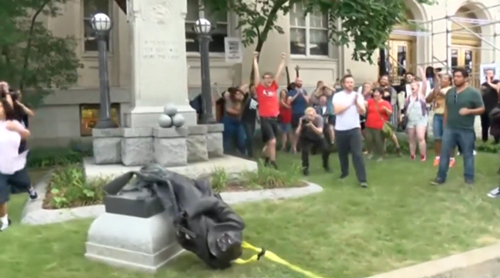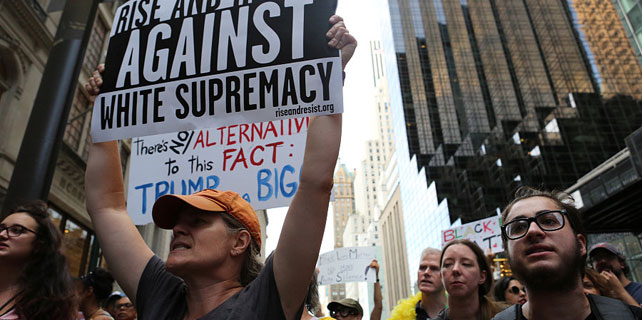US cities step up removal of Confederate statues, despite Virginia violence

Aug 15 (Reuters) - Undeterred by violence over the planned removal of a Confederate statue in Charlottesville, Virginia, municipal leaders in cities across the United States said this week they would step up efforts to pull such monuments from public spaces.
The mayors of Baltimore and Lexington, Kentucky, said on Monday they would push ahead with plans to remove statues as a national debate flared anew over whether monuments to the Confederacy are symbols of hate or heritage.
A rally by white nationalists protesting plans to remove a statue of General Robert E. Lee, commander of the pro-slavery Confederate army in the U.S. Civil War, sparked clashes with anti-racism demonstrators on Saturday. A woman was killed and 19 people were injured when a car plowed into a crowd of counter-protesters.
Officials in Memphis, Tennessee, and Jacksonville, Florida, announced new initiatives on Monday aimed at taking down Confederate monuments. And Tennessee Governor Bill Haslam, a Republican, urged lawmakers to rid the state's Capitol of a bust of Nathan Bedford Forrest, a Confederate general and early member of the Ku Klux Klan.
"This is a time to stand up and speak out," Lexington Mayor Jim Gray said in an interview on Monday. He brought forward the announcement of his city's efforts after the Charlottesville violence.
Saturday's clashes between white supremacists and counter protesters in Charlottesville, in which two police officers were also killed when their helicopter crashed, appeared to have accelerated the push to remove memorials, flags and other reminders of the Confederate cause.
Some opponents took matters into their own hands. Demonstrators stormed the site of a Confederate monument outside a courthouse in Durham, North Carolina, on Monday and toppled the bronze statue from its base.
Local television news footage showed protesters taking turns stomping and kicking the fallen statue as others cheered.
Durham County Sheriff Mike Andrews said in a statement on Tuesday that his office would seek vandalism charges against those involved.
The drive by civil rights groups and others to do away with Confederate monuments gained momentum after an avowed white supremacist murdered nine African-Americans at a Charleston, South Carolina, church in 2015. The shooting rampage ultimately led to the removal of a Confederate flag from the statehouse in Columbia.
RALLYING POINTS
In all, as of April, at least 60 symbols of the Confederacy had been removed or renamed across the United States since 2015, according to the Southern Poverty Law Center, which tracks hate groups.
But such efforts also have made Confederate flags and memorials a rallying point for white supremacists and other extreme right groups, according to Ryan Lenz, a spokesman for the center.
Opponents of Confederate memorials view them as an affront to African-Americans and ideals of racial diversity and equality. Supporters argue they represent an important part of history, honoring those who fought and died for the rebellious Southern states in the Civil War.
New Orleans' efforts to dismantle four Confederate statues sparked protests and litigation that became so contentious that crews waited until the middle of the night to remove a 14-foot-tall (4.2-meter-tall) bronze likeness of Confederate General P.G.T. Beauregard on horseback in May.
The violence in Charlottesville is unlikely to bolster the argument for maintaining the monuments as items of historical value, said Carl Jones, chief of heritage operations for the Sons of Confederate Veterans. But he said he would continue to make that case.
"Where does it stop? The Egyptian pyramids were built by slaves. Do we tear those down?" Jones said in a telephone interview. Egyptian archaeologists, however, say tombs found near the Great Pyramids prove they were built by free workers, not slaves.
Across the country, 718 Confederate monuments and statues remain, with nearly 300 of them in Georgia, Virginia or North Carolina, according to the Southern Poverty Law Center.
There are also 109 public schools named for Robert E. Lee, Confederate President Jefferson Davis or other leading figures of the Civil War-era South, the group said.
Baltimore Mayor Catherine Pugh said on Monday she would move forward in removing several statutes, including those of Lee and Stonewall Jackson. She stopped short of endorsing calls by some city council members for the monuments to be destroyed.
Memphis officials said the city would take legal action to get state approval to remove a Confederate statue there. The city council voted to remove it in 2015, but the effort was blocked by the state historical commission, local media said.
In Kentucky, Gray said he had heard opposition to his plans but that he had also received offers to pay for the statutes to be relocated as early as this fall.
"We expected criticism," he said. "It's a challenging and polarizing time - and issue."
(Reporting by Chris Kenning; Additing reporting by Steve Gorman; Editing by Colleen Jenkins, Richard Chang and Frances Kerry)















